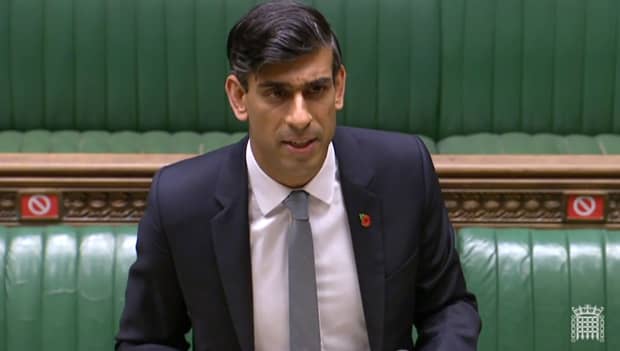This post was originally published on this site

A video grab from footage broadcast by the U.K. Parliament’s Parliamentary Recording Unit shows the Chancellor of the Exchequer Rishi Sunak as he gives an update of the economy in the House of Commons in London on November 5, 2020.
handout/Agence France-Presse/Getty Images
The pound rose on Thursday after the Bank of England said it would extend its quantitative easing program by £150 billion, more than the £100 billion expected by economists, and left interest rates at 0.1%.
The U.K. Treasury, at midday, said it would extend the Coronavirus Job Retention Scheme until March, meaning that furloughed employees will receive 80% of their usual salary for hours not worked, for the next five months. The Treasury had wanted to reduce support at the end of October, but a spike in coronavirus cases has led to a second lockdown in England.
“Economics students are taught about the twin levers of monetary and fiscal policy that policymakers have at their disposal and, as England settles into its second period of lockdown, both levers have been pulled in unison today,” said Chris Bailey, European strategist at Raymond James.
The pound GBPUSD, +0.81% picked up after the Bank of England decision and accelerated through the day. The pound traded at $1.3085, up from $1.2989 on Wednesday. The yield on the benchmark 10-year gilt TMBMKGB-10Y, 0.228% edged higher.
Philip Shaw, chief economist at Investec, said relief the Bank of England didn’t announce negative interest rates drove the reaction, even as the size of the bond buying was higher than the market anticipated.
Analysts at ING said the gains may not endure. “From the point of view of the rates markets, the escalation in the Bank’s communication around negative interest rates policy is likely to be seen as a vindication of existing expectations. The time frame for the implementation/operational study and engagement confirm that these would be more of a 2021 story,” said London-based strategists at ING.
They expect the pound to trade “on the soft side” due to uncertainty over the U.K.-European Union trade deal that is being negotiated and must be finished by the end of the year.
Equity markets, meanwhile, were focused on U.S. election news, and the rally that has ensued on the possibility of divided government. The FTSE 100 UKX, +0.53% rose 0.7% after jumping 1.7% on Wednesday.

